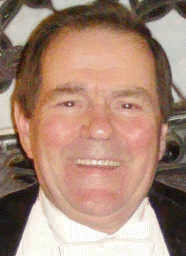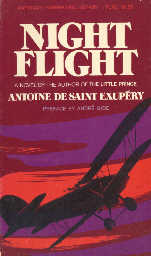Antoine de Saint-Exupéry's first novel on flying was Southern Mail and the flying then was only from France to Africa along
the northwestern coastline. In this novel we meet Fabien who is flying from the southernmost tip of South
America carrying the mail. St-Ex takes us inside the pilot's head as he imagines himself first as a ship entering
a harbor and then as a shepherd moving from one flock to another, only his flocks are small clusters of lights
and civilization thousands of feet beneath his wings.
[page 1] Fabien, the pilot bringing the Patagonia air mail from far south to Buenos
Aires, could mark night coming on by certain signs that called to mind the waters of
a harbor a calm expanse beneath, faintly rippled by the lazy clouds and he
seemed to be entering a vast anchorage, an immensity of blessedness.
Or else he might have fancied he was taking a quiet walk in the calm of
evening, almost like a shepherd. The Patagonian shepherds move, unhurried, from
one flock to another; and he, too, moved from one town to another, the shepherd of
those little towns. Every two hours he met another of them, drinking at its riverside
or browsing on its plain.
Sometimes, after a hundred miles of steppes as desolate as the sea, he
encountered a lonely farmhouse that seemed to be sailing backwards from him in a
great prairie sea, with its freight of human lives; and he saluted with his wings this
passing ship.
With this wingtip salute we climb in the cockpit with Fabien and join him and his navigator/wireless
operator in a 5,000 lb hunk of metal with a constant stream of fireworks spraying backwards from its five-hundred-horsepower engine just outside his window . In the rear is his precious cargo destined eventually
for France, the Patagonian airmail, the only communication link with the rest of the world for this isolated
outpost of humanity. In this cockpit we will be treated to the poetry in motion of St-Exupéry. Likely hell be sharing with us thoughts he had while flying the night mail himself.
[page 12] But night was rising like a tawny smoke and already the valleys were
brimming over with it. No longer were they distinguishable from the plains. The
villages were lighting up, constellations that greeted each other across the dusk.
And, at a touch of his finger, his flying-lights flashed back a greeting to them. The
earth grew spangled with light signals as each house lit its star, searching the
vastness of the night a s lighthouse sweeps the sea. Now every place that sheltered
human life was sparkling. And it rejoiced him to enter into this one night with a
measured slowness, as into an anchorage.
A pilot in those lonely days and nights of solitary flights carrying the mail apparently needed an
imagination to carry him through the otherwise utter boredom which might cut short his lucrative flying career.
Another pilot, Pellerin, brought his ship to a stop at an outpost airport after a particularly harrowed
encounter with a cyclone over the Andes. He stays in his cockpit listening, as it were, to the "long echoes of
the flight." From the ground, someone yells to him, "Well, aren't you going to get down?"
[page 17, 18] His impulse was to curse them for a lazy crowd, so sure of life they
seemed, gaping at the mon; but he decided to be genial instead.
". . . Drinks are on you!"
Then he climbed down.
He wanted to tell them about the trip.
"If only you knew . . . !"
But he doesn't tell them anything more. Instead St-Ex tells us the story of how Pellerin got lost in pitch
darkness, dancing amidst gale forces gusts through towering Alpine peaks. In his mind Pellerin think vs, "A
cyclone, that's nothing. A man just saves his skin!" But later he tells all to his boss, Rivière.
[page 21] Pellerin began by telling how his retreat had been cut off. It was almost
as if he were apologizing about it. "There was nothing else for it!" Then he had lost
sight of everything, blinded by the snow. He owed his escape to the violent air
currents which had driven him up to twenty-five thousand feet. "I guess they held
me all the way just above the level of the peaks."
In the next storm, we follow Fabien carrying the Patagonian mail and flying into a black wall of storm
ahead. The navigator has just leaned forward and tapped on Fabien's back, but the pilot did not move.
[page 35] Now the first eddies of the distant storm assailed them. The mass of metal
heaved gently up, pressing itself against the operator's limbs; and then it seemed
to melt away, leaving him for some seconds floating in the darkness, levitated The
clung to the steel bulwarks with both hands. The red lamp in the cockpit was all that
remained to him of the world of men and he shuddered to know himself descending
helpless into the dark heart of night, with only a little thing, a miner's safety lamp,
to see him through. He dared not disturb the pilot to ask his plans; he tightened his
grip on the steel ribs and, bending forward fixed his eyes upon the pilot's shadowed
back.
Fabien was too busy flying to respond to his navigator.
[page 35] In that obscurity the pilot's head and shoulders were all that showed
themselves. His torso was a block of darkness, incline a little to the left; his face
was set toward the storm, bathed intermittently, no doubt, by flickering gleams. He
could not see that face; all the feelings thronging there to meet the onset of the
storm were hidden from his eyes; lips set with anger and resolve, a white face
holding elemental colloquy with the leaping flashes ahead.
No one who has not flown or navigated under such conditions could write so vividly about
the experience. Obviously St-Ex had done both, and his writing flashed like brilliant lightning
bolts as Fabien's plane entered the storm.
Here's an example. Rivière has to fire Roblet because of a mistake he made. Roblet's been
in aviation during the twenty years there has been aviation, but "an example has to be made." Roblet
refuses to be downgraded to a fitter, so he must go. Rivière dismisses him from his presence even
though Roblet resisted going, saying, "No, sir, no. . . And there something more I'd like to say."
There would be all of it, except St-Ex takes us inside of Rivière's mind as he walks away from
Roblet holding his termination form.
[page 43, 44] Not he, thought Rivière, it wasn't he whom I dismissed so
brutally, but the mischief for which perhaps, he was not responsible, though
it came to pass through him. For, he mused, we can command events and
they obey us; and thus we are creators. These humble men, too, are things
and we create them. Or cast them aside when mischief comes about through
them.
"There something more I'd like to say." What did the poor fellow
want to say? That I was robbing him of all that made life dear? That he loved
the clang of tools upon the steel of airplanes, that all the ardent poetry of life
would now be lost to him . . . And then, a man must live?
"I am very tired," Rivière murmured and his fever rose, insidiously
caressing him. "I liked that old chap's face." He tapped the sheet of paper
with his finger. It came back to him, the look of the old man's hands and he
now seemed to see them shape a faltering gesture of thankfulness. "That's
all right," was all he had to say. "That's right. Stay!" And then He
pictured the torrent of joy that would flow through those old hands. Nothing
in all the world, it seemed to him, could be mor beautiful than that joy
revealed not on a face, but in those toil-worn hands. Shall I tear up this
paper? He imagined the old man's homecoming to his family, his modest
pride.
"So they're keeping you on?"
"What do you think? It was I who assembled the first plane in
Argentina!"
The old fellow would get back his prestige, the youngsters cease to
laugh.
As he was asking himself if he would tear it up, the telephone rang.
There was a long pause, full of the resonance and depth that wind and
distance can give to voices.
"Landing ground speaking. Who is there?"
"Rivière."
They had found a problem in an electric circuit. Rivière, reminded of the danger that least
error can bring to the pilot, navigator, and mail, thinks to himself, "Roblet shall go." Roblet may lose
that "ardent poetry of life", but St-Ex will recall it for us forever in his writings.
Rivière reveals to us his innermost thoughts about how he must push his pilots to drive
through storms, while one of his pilots who has heeded his exhortations is driving through a storm
from which he may never return.
[page 53] No the Patagonian mail was entering the storm and Fabien
abandoned all idea of circumventing it; it was too widespread for that, he
reckoned, for the vista of lightning flashes led far inland, exposing
battlement on battlement of clouds. He decided to try passing below it, ready
to beat a retreat if things took a bad turn.
This was a night flight which seemed fated never to see the light of day. We are in the tight
compartment of the cockpit with Fabien, our eyes straining into the darkness, striving to make sense
of the dimly lit instruments, muscles aching from holding onto the controls of this airplane turned
roller coaster in the thundering zephyrs of the clouds.
[page 68] It was as if dead matter were infected by his exasperation; at
every plunge the engine set up such furious vibrations that all the fuselage
seemed convulsed with rage. Fabien strained all his efforts to control;
crouching in the cockpit, he kept his eyes fixed on the artificial horizon only,
for the masses of the sky and land outside were not to be distinguished, lost
both alike in a welter as of worlds in the making. But the hands of the flying
instruments oscillated more and more abruptly, grew almost impossible to
follow. Already the pilot, misled by their vagaries, was losing altitude,
fighting against odds, while deadly quicksands sucked him down into the
darkness. He read his height, sixteen hundred just the level of the hills.
He guessed their towering billows hard upon him, for now it seemed that all
these earthen monsters, the least of which could crush him into nothingness,
were breaking loose from their foundations and careering about in a drunken
frenzy. A dark tellurian carnival was thronging closer and closer about him.
Rivière knew that, if Fabien didn't make it, he would have to break the news to his wife.
[page 74] Rivière knew all the tenderness of Fabien's wife, the fears that
haunted her; this love seemed only lent her for a while, like a toy to some
poor child. He thought of Faien's hand which firm on the controls, would hold
the balance of his fate some minutes yet; that hand had given caresses and
lingered on a breast, wakening a tumult there; a hand of godlike virtue, it
had touched a face, transfiguring it. A hand that brought miracles to pass.
But Rivière, Fabien, and Fabien's wife all have to wait throughout this night. Will the
Patagonian mail get through to Paris? Will Fabien and his wife be reunited in another joyful
embrace? Will Rivière change his mind about letting Roblet go? So many themes to play out, so few
pages remaining to go. One can only enjoy to the fullest every page as one enjoys every day, every
minute of one's life.
~^~
Any questions about this review, Contact: Bobby Matherne
~~~~~~~~~~~~~~~~~~~~~~~~~~~~~~~~~~~~~~~~~~~~~~~~~~~~~~~~~~

 == == == == == == == == == == == == == == == ==
== == == == == == == == == == == == == == == ==
22+ Million Good Readers have Liked Us
22,454,155
as of November 7, 2019
Mo-to-Date Daily Ave 5,528
Readers
For Monthly DIGESTWORLD Email Reminder:
Subscribe! You'll Like Us, Too!
== == == == == == == == == == == == == == == ==
Click Left Photo for List of All ARJ2 Reviews Click Right Bookcover for Next Review in List
Did you Enjoy this Webpage?
Subscribe to the Good Mountain Press Digest: Click Here!


CLICK ON FLAGS TO OPEN OUR FIRST-AID KIT.
All the tools you need for a simple Speed Trace IN ONE PLACE. Do you feel like you're swimming against a strong current in your life? Are you fearful? Are you seeing red? Very angry? Anxious? Feel down or upset by everyday occurrences? Plagued by chronic discomforts like migraine headaches? Have seasickness on cruises? Have butterflies when you get up to speak? Learn to use this simple 21st Century memory technique. Remove these unwanted physical body states, and even more, without surgery, drugs, or psychotherapy, and best of all: without charge to you.
Simply CLICK AND OPEN the
FIRST-AID KIT.

Counselor? Visit the Counselor's Corner for Suggestions on Incorporating Doyletics in Your Work.

All material on this webpage Copyright 2019 by Bobby Matherne





